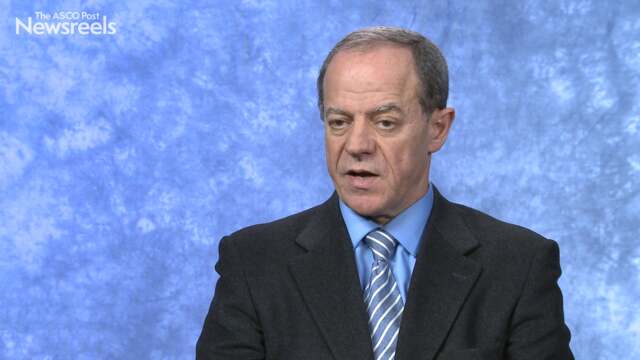Avelumab in Advanced Urothelial Carcinoma: Further Study Needed to Clarify its Role
AS REVIEWED in this issue of The ASCO Post, Patel and colleagues have presented data from the phase I JAVELIN study evaluating avelumab (Bavencio) in platinum-refractory patients with advanced urothelial carcinoma.1 The drug is active with durable responses when compared with historical...
Avelumab Active in Advanced Urothelial Carcinoma After Platinum Failure
AS REPORTED in The Lancet Oncology by Manish R. Patel, MD, of Florida Cancer Specialists/Sarah Cannon Research Institute, and colleagues, the anti–programmed cell death ligand 1 (PD-L1) antibody avelumab (Bavencio) produced durable responses in patients with locally advanced or metastatic...
2018 GU CANCERS SYMPOSIUM: New Model Predicts Survival for People With Bladder Cancer Receiving Immunotherapy
Researchers have developed a model to predict overall survival for people with advanced urothelial cancers treated with the immune checkpoint inhibitor atezolizumab (Tecentriq). The model, which is based on six clinical factors, may help inform treatment decisions for use of atezolizumab in these...
Joaquim Bellmunt, MD, PhD, on Bladder Cancer: The Future of Immunotherapies
Joaquim Bellmunt, MD, PhD, of Dana-Farber Cancer Institute, discusses refining treatment choices with new combinations and sequencing strategies.
Pembrolizumab in Advanced Urothelial Carcinoma
On May 18, 2017, pembrolizumab (Keytruda) was granted regular approval for treatment of patients with locally advanced or metastatic urothelial carcinoma who have disease progression during or following platinum-containing chemotherapy or within 12 months of neoadjuvant or adjuvant...
IMvigor211 Trial: Atezolizumab vs Chemotherapy in Platinum-Treated Advanced Urothelial Carcinoma
The phase III IMvigor211 trial showed no survival benefit for atezolizumab (Tecentriq) vs physician's choice of chemotherapy in platinum-treated locally advanced or metastatic urothelial carcinoma with programmed death-ligand 1 (PD-L1) expression ≥ 5%. Findings were reported in The Lancet by...
Arif Kamal, MD, MBA, MHS, Named Visionary in Hospice and Palliative Medicine
ARIF KAMAL, MD, MBA, MHS, Associate Professor of Medicine and Business Administration and Physician Director of Quality at the Duke Cancer Institute, was recently named by the American Academy of Hospice and Palliative Medicine as 1 of the 30 most influential leaders in hospice and palliative...
Expert Point of View: Yohann Loriot, MD, PhD
FORMAL DISCUSSANT of the RANGE trial at the ESMO 2017 Congress, Yohann Loriot, MD, PhD, of the Institut Gustave Roussy and University of Paris-Saclay, Villejuif, Paris, said that although the study met its primary endpoint, he was not sure the absolute improvement in progression-free survival is...
Positive Early Data on Second-Line Ramucirumab/Docetaxel in Platinum-Refractory Advanced Urothelial Cancer
RAMUCIRUMAB (CYRAMZA) added to docetaxel improved progression-free survival and almost doubled the overall response rate compared with docetaxel alone in patients with advanced or metastatic urothelial cancer that has progressed on platinum-based chemotherapy. These results of the phase III RANGE...
Expert Point of View: Maria De Santis, MD
THE 2017 EUROPEAN SOCIETY for Medical Oncology (ESMO) Congress spokesperson Maria De Santis, MD, of the University of Warwick, Coventry, and Queen Elizabeth Hospital, Cancer Center, in Birmingham, UK, said the survival advantage in KEYNOTE-045 updated results was noteworthy. “These results...
Second-Line Pembrolizumab Extends Survival in Urothelial Cancer
PEMBROLIZUMAB (KEYTRUDA) extended survival by about 3 months in patients with advanced urothelial cancer whose disease progressed on platinum-based chemotherapy vs investigator’s choice of therapy, according to the mature results of the KEYNOTE-045 trial presented at the European Society for...
First-Line Immunotherapy for Cisplatin-Ineligible Patients With Advanced Urothelial Cancer
As reported in The Lancet Oncology by Balar et al, first-line pembrolizumab (Keytruda) produced durable responses in cisplatin-ineligible patients with locally advanced and unresectable or metastatic urothelial cancer in the phase II KEYNOTE-052 trial. The trial supported the accelerated approval...
Avelumab in Locally Advanced or Metastatic Urothelial Carcinoma
In the Clinic provides overviews of novel oncology agents, addressing indications, mechanisms of action, administration recommendations, safety profiles, and other essential information needed for the appropriate clinical use of these drugs. On May 9, 2017, avelumab (Bavencio) was granted...
Durvalumab in Advanced Urothelial Carcinoma Progressing After Platinum Therapy
In the Clinic provides overviews of novel oncology agents, addressing indications, mechanisms of action, administration recommendations, safety profiles, and other essential information needed for the appropriate clinical use of these drugs. On May 1, 2017, durvalumab (Imfinzi) was granted...
ESMO 2017: KEYNOTE-045: Updated Results Support Pembrolizumab as Second-Line Treatment in Advanced Urothelial Cancer
Mature results from the KEYNOTE-045 trial presented at the European Society for Medical Oncology (ESMO) 2017 Congress in Madrid (Abstract LBA37_PR) confirmed significantly longer survival in patients with advanced urothelial cancer who received the checkpoint inhibitor pembrolizumab after initial...
Adjuvant Chemotherapy vs Observation After Neoadjuvant Therapy and Radical Cystectomy for Bladder Cancer
In an analysis reported in JAMA Oncology, Seisen et al found that adjuvant chemotherapy was associated with a survival benefit vs observation in patients with adverse prognostic features after neoadjuvant therapy and radical cystectomy for urothelial carcinoma of the bladder. Study Details The...
Recombinant Adenovirus Interferon-α With Syn3 in BCG-Refractory or Relapsed Non–Muscle Invasive Bladder Cancer
A phase II study has shown activity of recombinant adenovirus interferon-α with Syn3 (rAd-IFNα/Syn3), a replication-deficient recombinant adenovirus gene transfer vector, in patients with high-grade bacillus Calmette-Guerin (BCG)-refractory or -relapsed non–muscle invasive bladder ...
Atezolizumab in Patients With Advanced Urothelial Carcinoma Who Are Ineligible for Cisplatin
In the Clinic provides overviews of novel oncology agents, addressing indications, mechanisms, administration recommendations, safety profiles, and other essential information needed for the appropriate clinical use of these drugs. On April 17, 2017, the programmed cell death ligand 1 (PD-L1)...
Maha Hussain, MD, FACP, FASCO, Credits Collaboration for Her Contributions to Genitourinary Cancer
Internationally recognized genitourinary oncologist Maha Hussain, MD, FACP, FASCO, was born and reared in Baghdad, Iraq. “I came from a family that stressed the value of higher education and especially medicine. I have three uncles who are physicians, and my father encouraged my three siblings and...
Durvalumab in Locally Advanced or Metastatic Urothelial Carcinoma
Updated results of a phase I/II study of durvalumab (Imfinzi) in locally advanced or metastatic urothelial carcinoma were reported by Powles et al in JAMA Oncology. Data from the ongoing study supported the recent approval of durvalumab as second-line treatment in this setting on the basis of...
Treatment of Nonmetastatic Muscle-Invasive Bladder Cancer: AUA/ASCO/ASTRO/SUO Guideline
As reported in the Journal of Oncology Practice by Chang et al, for the first time for any type of malignancy, the American Urological Association (AUA), ASCO, American Society for Radiation Oncology (ASTRO), and Society of Urologic Oncology (SUO) have formulated an evidence-based guideline on...
Pembrolizumab in Second-Line Therapy for Advanced Urothelial Carcinoma
THE TREATMENT OF metastatic urothelial carcinoma experienced a long period of stagnation until the recognition that targeting the programmed cell death protein 1 (PD-1) pathway could yield deep and durable responses.1-3 Cisplatin-based combination chemotherapy has been the reference standard for...
Pembrolizumab Improves Overall Survival vs Chemotherapy in Second-Line Therapy for Advanced Urothelial Carcinoma
IN THE PHASE III KEYNOTE-045 trial reported in The New England Journal of Medicine, Joaquim Bellmunt, MD, PhD, of Dana-Farber Cancer Institute, and colleagues found that pembrolizumab (Keytruda) significantly improved overall survival vs investigator choice of chemotherapy as second-line treatment ...
Avelumab in Refractory Metastatic Urothelial Carcinoma
The programmed cell death ligand 1 (PD-L1)–inhibitor avelumab (Bavencio) has shown activity in patients with refractory metastatic urothelial cancer, according to findings in a phase Ib study reported by Andrea B. Apolo, MD, of the Genitourinary Malignancies Branch, Center for Cancer Research,...
Strides Being Made in Advanced Urothelial Cancer
According to Srikala S. Sridhar, MD, MSc, FRCPC, of the Princess Margaret Cancer Centre, Toronto, Canada, “It’s an exciting time in the field of urothelial cancer,” thanks to the emergence of new therapies such as the immune checkpoint inhibitors and other approaches that aim to improve both...
Elizabeth R. Plimack, MD, on Advanced Urothelial Cancer: Expert Perspective
Elizabeth R. Plimack, MD, of Fox Chase Cancer Center, discusses highlights of three important abstracts on advanced and metastatic urothelial cancer presented at the 2017 ASCO Annual Meeting. (Abstracts 4501, 4503, 106)
European Commission Approves Nivolumab for Previously Treated, Locally Advanced, Unresectable or Metastatic Urothelial Cancer
On June 2, the European Commission (EC) approved nivolumab (Opdivo) for the treatment of locally advanced unresectable or metastatic urothelial carcinoma in adults after failure of prior platinum-containing therapy. This makes nivolumab the first immuno-oncology agent approved in the European Union ...
David I. Quinn, MBBS, PhD, on Urothelial Cancer: Results from KEYNOTE-045
David I. Quinn, MBBS, PhD, of the University of Southern California, gives his expert perspective on the planned survival analysis from a phase III open-label study of pembrolizumab vs paclitaxel, docetaxel, or vinflunine in recurrent, advanced urothelial cancer. (Abstract 4501)
Dean F. Bajorin, MD, and Peter H. O’Donnell, MD, on Urothelial Cancer: Results From Two KEYNOTE Trials
Dean F. Bajorin, MD, of Memorial Sloan Kettering Cancer Center, and Peter H. O’Donnell, MD, of The University of Chicago Medical Center, discuss their study findings on treating advanced urothelial cancer with pembrolizumab, paclitaxel, docetaxel, or vinflunine. (Abstracts 4501 and 4502)
Metastatic Urothelial Carcinoma: A Model Malignancy for Immune Checkpoint Blockade
Platinum-based combination chemotherapy became a mainstay of first-line treatment for metastatic urothelial cancer in the 1980s. With combination platinum-based regimens, 40% to 50% of patients achieve an objective response to treatment. However, aside from approximately 5% to 10% of patients who...
CheckMate 275 Supports FDA Approval of Nivolumab in Metastatic Urothelial Carcinoma After Platinum Therapy
As reported in The Lancet Oncology by Padmanee Sharma, MD, PhD, of MD Anderson Cancer Center, and colleagues, the phase II CheckMate 275 trial has shown that nivolumab (Opdivo) produced durable responses in patients with metastatic urothelial cancer who had received at least one prior...
NCCN Clinical Practice Guidelines in Oncology (NCCN Guidelines®): 2017 Guidelines
NCCN Clinical Practice Guidelines in Oncology (NCCN Guidelines®): 2017 Guidelines In 1996, the National Comprehensive Cancer Network® (NCCN®) published its first set of Clinical Practice Guidelines in Oncology®, covering 8 tumor types. Guidelines are now published for more than 60 tumor types and...
AUA 2017: Phase III Study of Blue Light Cystoscopy With Optical Imaging Agent in Bladder Cancer
New phase III study results of blue light flexible cystoscopy (BLFC) with an optical imaging agent (Hexvix/Cysview) were presented by Daneshmand et al during a late-breaking plenary session at the 2017 American Urological Association (AUA) Annual Meeting (Abstract PPTLBA-02). Major Findings The...
FDA Approves Pembrolizumab for Advanced or Metastatic Urothelial Carcinoma
Today, the U.S. Food and Drug Administration (FDA) granted regular approval to pembrolizumab (Keytruda) for patients with locally advanced or metastatic urothelial carcinoma who have disease progression during or following platinum-containing chemotherapy or within 12 months of neoadjuvant or...
AUA 2017: Studies Examine Bladder Cancer Risk and Mortality in E-Cigarette and Traditional Smokers
Data presented at the 2017 Annual Scientific Meeting of the American Urological Association (AUA) showed harmful links between the use of e-cigarettes and bladder cancer risk, and associated the smoking of traditional cigarettes to a higher risk of mortality among patients with bladder cancer. Even ...
FDA Grants Accelerated Approval to Avelumab for Urothelial Carcinoma
Today, the U.S. Food and Drug Administration (FDA) granted accelerated approval to avelumab (Bavencio) for patients with locally advanced or metastatic urothelial carcinoma whose disease progressed during or following platinum-containing chemotherapy or within 12 months of neoadjuvant or adjuvant...
SWOG Launches First Prospective Registration Trial With Atezolizumab in BCG-Unresponsive Non–Muscle Invasive Bladder Cancer
The standard of care for patients with bacillus Calmette-Guérin (BCG)-unresponsive, high-risk non–muscle invasive bladder cancer is radical cystectomy. Novel therapies that allow patients to preserve their bladder are urgently needed. SWOG (formerly the Southwest Oncology Group), a member of...
FDA Approves Durvalumab in Locally Advanced or Metastatic Urothelial Carcinoma
Today, the U.S. Food and Drug Administration (FDA) granted accelerated approval to durvalumab (Imfinzi) for the treatment of patients with locally advanced or metastatic urothelial carcinoma who have disease progression during or following platinum-containing chemotherapy or who have disease...
Second-Line Pazopanib vs Weekly Paclitaxel in Relapsed or Progressive Urothelial Cancer
A UK phase II trial comparing pazopanib (Votrient) with paclitaxel after failure of platinum-based therapy in patients with locally advanced or metastatic urothelial carcinoma was stopped early due to futility. These results were reported by Jones et al in the Journal of Clinical Oncology. Two...
Nivolumab in Urothelial Carcinoma After Platinum Therapy
On February 2, 2017, nivolumab (Opdivo) was granted accelerated approval for the treatment of patients with locally advanced or metastatic urothelial carcinoma who have disease progression during or after platinum-containing chemotherapy or have disease progression within 12 months of neoadjuvant...
FDA Grants Atezolizumab Accelerated Approval as Initial Treatment for Some Advanced Bladder Cancers
On April 17, the U.S. Food and Drug Administration (FDA) granted accelerated approval to atezolizumab (Tecentriq) for the treatment of patients with locally advanced or metastatic urothelial carcinoma who are not eligible for cisplatin chemotherapy. Atezolizumab was previously approved for people...
Elizabeth R. Plimack, MD, on Bladder Cancer: Management Updates
Elizabeth R. Plimack, MD, of Fox Chase Cancer Center, discusses selecting first- and second-line therapies for patients with advanced bladder cancer and the emerging data and role of immune checkpoint inhibitors.
Study Identifies How Cancer Cells May Develop Resistance to FGFR Inhibitors
A new study by researchers at The Ohio State University Comprehensive Cancer Center–Arthur G. James Cancer Hospital and Richard J. Solove Research Institute (OSUCCC– James) has identified a mechanism by which cancer cells develop resistance to a class of drugs called fibroblast growth...
Pembrolizumab in Locally Advanced or Metastatic Urothelial Cancer
As reported by Elizabeth R. Plimack, MD, of Fox Chase Cancer Center, Temple Health, and colleagues in The Lancet Oncology, pembrolizumab (Keytruda) has shown activity in patients in the locally advanced or metastatic urothelial carcinoma cohort included in the phase Ib KEYNOTE-012 trial. In the...
Phase II Trial Evaluates New Gene Therapy for Non–Muscle Invasive Bladder Cancer After BCG
A novel approach using intravesical gene therapy showed promising activity in a phase II trial that enrolled patients with bacillus Calmette-Guérin (BCG)-refractory or -relapsed nonmuscle invasive bladder cancer.1 The rate of high-grade relapse-free survival at 12 months was 35% in patients treated ...
Pembrolizumab vs Chemotherapy in Second-Line Treatment of Advanced Urothelial Carcinoma
In a phase III KEYNOTE-045 trial reported in The New England Journal of Medicine, Bellmunt et al found that pembrolizumab (Keytruda) significantly improved overall survival vs investigator choice of chemotherapy as second-line treatment in patients with advanced urothelial cancer whose disease...
Roland Seiler, MD, on Bladder Cancer: Subtypes and Treatment Response (German Language Version)
Roland Seiler, MD, of the University of British Columbia, discusses in German a way to identify molecular subtypes of muscle-invasive bladder cancer, the varying responses to cisplatin-based neoadjuvant chemotherapy, and which patients show the most benefit. (Abstract 281)
Karim Chamie, MD, on Bladder Cancer: Optimizing Surgical and Medical Therapies
Karim Chamie, MD, of the University of California, Los Angeles, discusses induction and maintenance BCG therapy in non–muscle-invasive bladder cancer.
Roland Seiler, MD, on Bladder Cancer: Subtypes and Treatment Response
Roland Seiler, MD, of the University of British Columbia, discusses a way to identify molecular subtypes of muscle-invasive bladder cancer, the varying responses to cisplatin-based neoadjuvant chemotherapy, and which patients show the most benefit. (Abstract 281)








